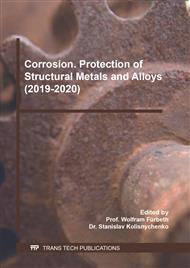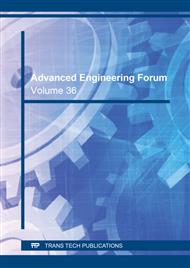[1]
M. Shymala, P.K. Kasthuri, The inhibitory action of the extracts of Adathodavasica, Ecliptaalba, and Centellaasiatica on the corrosion of mild steel in hydrochloric acid medium: a comparative study, Int. J. Corros. (2012) 1–13.
Google Scholar
[2]
L.R. Chauhan, G. Gunasekauran, Corrosion inhibition of mild steel by plant extract in dilute HCl medium, Corros. Sci. 49 (2007) 1143–1161.
DOI: 10.1016/j.corsci.2006.08.012
Google Scholar
[3]
S.S. Shivakumar, K.N.S. Mohana, Ziziphusmauritiana leaves extracts as corrosion inhibitor for mild steel in H2SO4 and HCl solutions, Eur. J. Chem. 3 (2012) 426–432.
DOI: 10.5155/eurjchem.3.4.426-432.671
Google Scholar
[4]
M.A. Quraishi, A. Singh, V.K. Singh, D.K. Yadav, A.K. Singh, Green approach to corrosion inhibition of mild steel in hydrochloric acid and sulphuric acid solutions by the extract of Murrayakoenigii leaves, Mater. Chem. Phys. 122 (2010) 114–122.
DOI: 10.1016/j.matchemphys.2010.02.066
Google Scholar
[5]
G. Avci, Inhibitor effect of N,N-methylenediacrylamide on corrosion behavior of mild steel in 0.5 M HCl, Mater. Chem. Phys. 112 (2008) 234–238.
DOI: 10.1016/j.matchemphys.2008.05.036
Google Scholar
[6]
E.S. Meresht, T.S. Farahani, J. Neshati, 2-Butyne-1,4-diol as anovel corrosion inhibitor for API X65 steel pipeline in carbon-ate/bicarbonate solution, Corros. Sci. 54 (2012) 36–44.
DOI: 10.1016/j.corsci.2011.08.052
Google Scholar
[7]
M. Heydari, M. Javidi, Corrosion inhibition and adsorption XXXáterXXXor of an amido-imidazoline derivative on API 5L X52 steel in CO2-saturated solution and synergistic effect of iodide ions, Corros. Sci. 61 (2012) 148–155.
DOI: 10.1016/j.corsci.2012.04.034
Google Scholar
[8]
X. Jiang, Y.G. Zheng, W. Ke, Effect of flow velocity and entrained sand on inhibition performances of two inhibitors for CO2 corrosion of N80 steel in 3% NaCl solution, Corros. Sci. 47 (2005) 2636–2658.
DOI: 10.1016/j.corsci.2004.11.012
Google Scholar
[9]
A.Garnica-Rodriguez, J. Genesca, J. Mendoza-Flores, R. Duran-Romero, Electrochemical evaluation of aminotriazole corrosion inhibitor under flow conditions, J. Appl. Electrochem. 39 (2009) 1809–1819.
DOI: 10.1007/s10800-009-9884-4
Google Scholar
[10]
P.C. Okafor, X. Liu, Y.G. Zheng, Corrosion inhibition of mild steel by ethylamino imidazoline derivative in CO2-saturated solution, Corros. Sci. 51 (2009) 761– 768.
DOI: 10.1016/j.corsci.2009.01.017
Google Scholar
[11]
A.A. Mazhar, W.A. Badaway, M.M. Abou-Romia. Impedance studies of corrosion resistance of aluminium in chloride media. Surf.Coat.Techol. 29 (1986) 335-345.
DOI: 10.1016/0257-8972(86)90006-x
Google Scholar
[12]
A. Zarrouk, B. Hammouti, H. Zarrok, R. Salghi, A. Dafali, Lh.Bazzi, L. Bammou, S.S. Al-Deyab, Electrochemical impedancespectroscopy and weight loss study for new pyridazinederivativeas inhibitor for copper in nitric acid, Der Pharm. Chem. 4 (2012)337–346.
DOI: 10.1007/s11164-012-0548-3
Google Scholar
[13]
M. Gopiraman, N. Selvakumaran, D. Kesavan, R. Karvembu, Adsorption and corrosion inhibition XXXáterXXXor of N-(phenylcarbamothioyl)benzamide on mild steel in acidic medium, Prog. Org. Coat. 73 (2012) 104–111.
DOI: 10.1016/j.porgcoat.2011.09.006
Google Scholar
[14]
H. Hamani, T. Douadi, M. Al-Noaimi, S. Issaadi, D. Daoud, S. Chafaa. Electro- chemical and quantum chemical studies of some azomethine compounds as corrosion inhibitors for mild steel in 1 M hydrochloric acid.CorrosSci 88 (2014) 234–245.
DOI: 10.1016/j.corsci.2014.07.044
Google Scholar
[15]
S.L. Granese, B.M. Rosales, C. Oviedo, J.O. Zerbino. The inhibition action of hete- rocyclic nitrogen organic compounds on Fe and steel in HClmedia.CorrosionSci 33(1992)1439–53.
DOI: 10.1016/0010-938x(92)90182-3
Google Scholar
[16]
El Ashry E , El Nemr A , Essawy S , Ragab S . Corrosion inhibitors part V: QSAR of benzimidazole and 2-substituted derivatives as corrosion inhibitors by using the quantum chemical parameters. Prog Org Coat 61 (2008)11–20.
DOI: 10.1016/j.porgcoat.2007.08.009
Google Scholar
[17]
M. Djenane, S. Chafaa, N. Chafai, R. Kerkour, A. Hellal. Synthesis, spectral properties and corrosion inhibition efficiency of new ethyl hydrogen [(methoxyphenyl) (methylamino) methyl] phosphonate derivatives: Experimental and theoretical investigation. Journal of Molecular Structure. 1175 (2018) 398 ̶ 413.
DOI: 10.1016/j.molstruc.2018.07.087
Google Scholar
[18]
M.R. Laamari, J. Benzakour, F. Berrekhis, A. Derja, D. Villemin. Adsorption and corrosion inhibition of mild steel in hydrochloric acid medium by hexamethylenediamine tetra(methylene phosphonic acid) Arabian Journal of Chemistry 9 (2016) 245–251.
DOI: 10.1016/j.arabjc.2011.03.018
Google Scholar
[19]
H.Amar, J.Benzakour, A.Derja, D.Villemin, B.Moreau, T.Braisaz.Piperidin-1-yl-phosphonic acid and (4-phosphono-piperazin-1-yl) phosphonic acid: A new class of iron corrosion inhibitors in sodium chloride 3% media. Applied Surface Science 252 (2006) 6162-6172.
DOI: 10.1016/j.apsusc.2005.07.073
Google Scholar
[20]
K.Benbouguerra, S. Chafaa, N. Chafai, M. Mehri, O. Moumeni, A. Hellal. Synthesis, spectroscopic characterization and a comparative study of the corrosion inhibitive efficiency of an α-aminophosphonate and Schiff base derivatives: Experimental and theoretical investigations. Journal of Molecular Structure. 1157 (2018) 165 ̶ 176.
DOI: 10.1016/j.molstruc.2017.12.049
Google Scholar
[21]
J.Salaam,L.Tabti,S.Bahamyirou,A.Lecointre O.H. Alba,O.Jeannin,F.Camerel,S. Cianférani,E.Bentouhami, A.M. Nonat,and L.J. Charbonnière. Formation of Mono-and Polynuclear Luminescent Lanthanide Complexes based on the Coordination of PreorganizedPhosphonated Pyridines Inorg. Chem. 57 (2018) 6095−6106.
DOI: 10.1021/acs.inorgchem.8b00666
Google Scholar
[22]
A. Nonat, S. Bahamyrou, A. Lecointre, F. Przybilla, Y. Mély, C. Platas-Iglesias, F. Camerel, O. Jeannin, L.J. Charbonnière, Molecular upconversion in XXXáter in heteropolynuclear supramolecular Tb/Yb assemblies J. Am. Chem. Soc. 2019, 141, 1568-1576.
DOI: 10.1021/jacs.8b10932
Google Scholar
[23]
J.V. Nardeli, C.S. Fugivara, M.Taryba, E.R.P. Pjnto, M.F. Montemor, A.V. Benedetti, Tannin:A natural inhibitorforaluminumalloys, Progress in OrganicCoatings, ISSN:0300-9440,135(2019)368-381.
DOI: 10.1016/j.porgcoat.2019.05.035
Google Scholar
[24]
J.C.da Rocha, J.A.C.P. Gomes, E.D'Elia, Corrosioninhibition of carbon Steel in hydrochloricacidsolutionbyfruitpeelaqueousextracts. Corros.,Sci. 52(2010), pp.2341-2348, 10.1016/J.corsci.2010.03.033.
Google Scholar
[25]
A. A. Farag, M.R. Noor El-Din, The adsorption and corrosion inhibition of some nonionic surfactants on API X65 steel surface in hydrochloric acid, Corros. Sci. 64 (2012) 174–183.
DOI: 10.1016/j.corsci.2012.07.016
Google Scholar
[26]
D.K. Yadav, M.A. Quraishi, B. Maiti, Inhibition effect of some benzylidenes on mild steel in 1 M HCl: an experimental and theoretical correlation. Corros. Sci. 55 (2012) 254–266.
DOI: 10.1016/j.corsci.2011.10.030
Google Scholar
[27]
Z. Tao, S. Zhang, W. Li, B. Hou, Corrosion inhibition of mild steel in acidic solution by some oxo-triazole derivatives.Corros.Sci.51 (2009) 2588-2595.
DOI: 10.1016/j.corsci.2009.06.042
Google Scholar
[28]
M.Shahin, S.Bilgic, H.Yilmaz, The inhibition effects of some cyclic nitrogen compoundson the corrosion of the steel in NaCl medium. Appl. Surf. Sci. 195(2003) 1–7.
Google Scholar
[29]
A.D. Becke, A new mixing of Hartree–Fock and local density‐functional theories. J.Chem.Phys 98 (1993)1372-1377.
DOI: 10.1063/1.464304
Google Scholar
[30]
M.J. Frisch, G.W. Trucks, H.B. Schlegel, G.E. Scuseria, M.A. Robb, J.R. Cheeseman, G. Scalmani, V. Barone, B. Mennucci, G.A. Petersson, H. Nakatsuji, M. Caricato, X. Li, H.P. Hratchian, A.F. Izmaylov, J. Bloino, G. Zheng, J.L. Sonnenberg, M. Hada, M. Ehara, K. Toyota, R. Fukuda, J. Hasegawa, M. Ishida, T. Nakajima, Y. Honda, O. Kitao, H. Nakai, T. Vreven, J.A. Montgomery Jr., J.E. Peralta, F. Ogliaro, M. Bearpark, J.J. Heyd, E. Brothers, K.N. Kudin, V.N. Staroverov, R. Kobayashi, J. Normand, K. Raghavachari, A. Rendell, J.C. Burant, S.S. Iyengar, J. Tomasi, M. Cossi, N. Rega, J.M. Millam, M. Klene, J.E. Knox, J.B. Cross, V. Bakken, C. Adamo, J. Jaramillo, R. Gomperts, R.E. Stratmann, O. Yazyev, A.J. Austin, R. Cammi, C. Pomelli, J.W. Ochterski, R.L. Martin, K. Morokuma, V.G. Zakrzewski, G.A. Voth, P. Salvador, J.J. Dannenberg, S. Dapprich, A.D. Daniels, O. Farkas, J.B. Foresman, J.V. Ortiz, J. Cioslowski, D.J. Fox, Gaussian 09, Revision A1, Gaussian, Inc., Wallingford, CT, (2009).
Google Scholar
[31]
B. Ramaganthan, M. Gopiraman, L.O. Olasunkanmi, M.M. Kabanda, S. Yesudass, I. Bahadur, A.S. Adekunle, I.B. Obot, E.E. Ebenso, Synthesized photo-cross-linking chalcones as novel corrosion inhibitors for mild steel in acidic medium: experimental, quantum chemical and Monte Carlo simulation studies, RSC Adv. 5 (2015) 76675–76688.
DOI: 10.1039/c5ra12097g
Google Scholar
[32]
E.E. Oguzie, C.B. Adindu, C.K. Enenebeaku, C.E. Ogukwe M.A. Chidiebere, K.L. Oguzie, Natural products for materials protection: mechanism of corrosion inhibition of mild steel by acid extracts of Piper guineense, J. Phys. Chem. C 116 (2012) 13603–13615.
DOI: 10.1021/jp300791s
Google Scholar
[33]
R.G. Pearson, Absolute electronegativity and hardness: application to inorganic chemistry, Inorg. Chem., 27 (1988), PP. 734-740, 10.1016/J.corsci.2008.08.043.
DOI: 10.1021/ic00277a030
Google Scholar
[34]
V.S. Sastri, J.R. Perumareddi . Molecular orbital theoretical studies of some or- ganic corrosion inhibitors.Corrosion 53 (1997) 617–629.
DOI: 10.5006/1.3290294
Google Scholar
[35]
Materials studio, 7.0 San Diego, CA: Accelrys Inc.; (2013).
Google Scholar
[36]
I.B. Obot, N.O. Obi-Egbedi. Anti-corrosive properties of xanthone on mild steel corrosion in sulphuric acid: experimental and theoretical investigations, Curr. Appl. Phys. 11 (2011) 382–392.
DOI: 10.1016/j.cap.2010.08.007
Google Scholar
[37]
A.K. Maayta, N.A.F. Al-Rawashdeh. Inhibition of acidic corrosion of pure aluminum by some organic compounds.Corros. Sci. 46 (2004) 1129-1140.
DOI: 10.1016/j.corsci.2003.09.009
Google Scholar
[38]
J. Aljourani, K. Raeissi, M.A. Golozar. Benzimidazole and its derivatives as corrosion inhibitors for mild steel in 1M HCl solution. Corros. Sci. 51 (2009) 1836-1843.
DOI: 10.1016/j.corsci.2009.05.011
Google Scholar
[39]
C.Cao. On Electrochemical technique for interface inhibitor research.Corrs.Sci.38 (1996) 2073-2082.
Google Scholar
[40]
I.B .Obot, N.O. Obi-Egbedi, N.W. Odozi. Acenaphtho[1,2-b] quinoxaline as a novel corrosion inhibitor for mild steel in 0.5M H2SO4. Corros. Sci. 52(2010) 923–926.
DOI: 10.1016/j.corsci.2009.11.013
Google Scholar
[41]
N.Labjar, M.Lebrini, F.Bentiss, N.E. Chihib, S.ElHadjjaji, C.Jama. Corrosion inhibition of mild steel and antibacterial proprieties of aminotris(methyl nephosnic) acid,Mater.Chem.Phys.119 (2010) 330-336.
DOI: 10.1016/j.matchemphys.2009.09.006
Google Scholar
[42]
F.Bentiss, M. Lebrini, M. Lagrenee, Thermodynamic characterization of metal dissolution and inhibitor adsorption processes in mild steel/2,5-bis(n-thienyl)- 1,3,4-thiadiazoles/hydrochloric acid system, Corros. Sci. 47 (2005) 2915–2931.
DOI: 10.1016/j.corsci.2005.05.034
Google Scholar
[43]
W. Li, Q. He, S. Zhang, C. Pei, B. Hou, Some new triazole derivatives as inhibitors for mild steel corrosion in acidic medium J. Appl. Electrochem. 38 (2008) 289–295.
DOI: 10.1007/s10800-007-9437-7
Google Scholar
[44]
C.M. Goulart, A. Esteves-Souza, C.A. Martinez-Huitle, C.J.F. Rodrigues, M.A.M. Maciel, A. Echevarria, Experimental and theoretical evaluation of semicarbazones and thiosemicarbazones as organic corrosion inhibitors, Corros. Sci. 67 (2013) 281–291.
DOI: 10.1016/j.corsci.2012.10.029
Google Scholar
[45]
R. Hasanov, M. Sadıkoğlu, S. Bilgic, Electrochemical and quantum chemical studies of some Schiff bases on the corrosion of steel in H2SO4 solution, Appl. Surf. Sci. 253 (2007) 3913–3921.
DOI: 10.1016/j.apsusc.2006.08.025
Google Scholar
[46]
G. Gece .The use of quantum chemical methods in corrosion inhibitor studies.CorrosSci 50 (2008) 2981–2992.
DOI: 10.1016/j.corsci.2008.08.043
Google Scholar
[47]
E. Jamalizadeh, S.M.A. Hosseini, A.H. Jafari. Quantum chemical studies on corrosion inhibition of some lactones on mild steel in acid media.CorrosSci 51 (2009) 1428–1435.
DOI: 10.1016/j.corsci.2009.03.029
Google Scholar
[48]
K. F. Khaled .Electrochemical investigation and modeling of corrosion inhibition of aluminum in molar nitric acid using some sulphur-containing amines.CorrosSci 52 (2010) 2905–2916.
DOI: 10.1016/j.corsci.2010.05.001
Google Scholar
[49]
I. Lukovits, K. Pálfi, I. Bakó, E. Kálmán. LKP model of the inhibition mechanism of thiourea compounds. Corrosion 53 (1997) 915–919.
DOI: 10.5006/1.3290275
Google Scholar
[50]
A.Y. Musa, A.A.H. Kadhum, A.B. Mohamad, A.A. Rahoma, H. Mesmari, Electrochemical and quantum chemical calculations on 4,4- dimethyloxazolidine-2-thione as inhibitor for mild steel corrosion in hydrochloric acid, J. Mol. Struct. 969 (2010) 233–237.
DOI: 10.1016/j.molstruc.2010.02.051
Google Scholar
[51]
M. Finšgar, A. Lesar, A. Kokalj, I. Milošev, A comparative electrochemical and quantum chemical calculation study of BTAH and BTAOH as copper corrosion inhibitors in near neutral chloride solution, Electrochim. Acta 53 (28) (2008) 8287–8297.
DOI: 10.1016/j.electacta.2008.06.061
Google Scholar
[52]
D. Zhang, Z. An, Q. Pan, L. Gao, G. Zhou, Comparative study of bis-piperidiniummethyl-urea and mono-piperidiniummethyl-urea as volatile corrosion inhibitors for mild steel, Corrosion Sci. 48 (2006) 1437-1448.
DOI: 10.1016/j.corsci.2005.06.007
Google Scholar
[53]
A.S. Fouda, A.S. Ellithy. Inhibition effect of 4-phenylthiazole derivatives on corrosion of 304L stainless steel in HClsolution.Corros. Sci. 51 (2009) 868–875.
DOI: 10.1016/j.corsci.2009.01.011
Google Scholar
[54]
R.M. Issa, M.K. Awad, F.M. Atlam, Quantum chemical studies on the inhibition of corrosion of copper surface by substituted uracils, Appl. Surf. Sci. 255 (2008) 2433-2441.
DOI: 10.1016/j.apsusc.2008.07.155
Google Scholar
[55]
M. Lashkari, M.R. Arshadi, DFT studies of pyridine corrosion inhibitors inelectrical double layer: solvent, substrate, and electric field effects, Chem.Phys. 299 (2004) 131-137.
DOI: 10.1016/j.chemphys.2003.12.019
Google Scholar
[56]
I. Lukovits, E. Kálmán, F. Zucchi, Corrosion inhibitors-correlation between electronic structure and efficiency, Corrosion 57 (2001) 3-8.
DOI: 10.5006/1.3290328
Google Scholar
[57]
N. Chafai, S. Chafaa, K. Benbouguerra, D. Daoud, A. Hellal, M. Mehri. Synthesis, characterization and the inhibition activity of a new αaminophosphonic derivative on the corrosion of XC48 mild steel in 0.5 M H2SO4: Experimental and theoretical studies..Journal of the Taiwan Institute of Chemical Engineers 70 (2017) 331–344.
DOI: 10.1016/j.jtice.2016.10.026
Google Scholar



